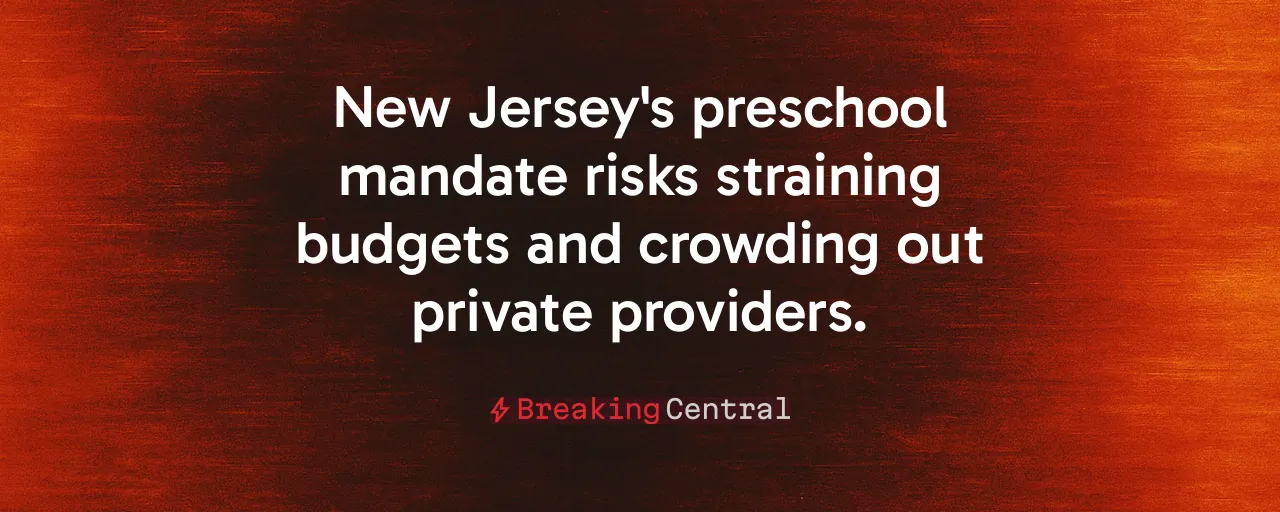A Costly Mandate Hits New Jersey Families
New Jersey's latest education overhaul, signed into law by Governor Phil Murphy, promises free preschool and full-day kindergarten for all by 2030. The plan, backed by a three-bill package, pours $1.2 billion annually into early childhood programs, adding 229 school districts to state-funded preschool rosters. While supporters hail it as a step toward equity, the initiative raises red flags for taxpayers and parents who value choice. The state's push for universal access could reshape family dynamics and local budgets in ways that demand scrutiny.
This legislation locks in a funding formula that commits New Jersey to massive long-term spending. With per-pupil preschool costs already at $17,500, among the nation's highest, the state's budget could face serious strain. Local districts, tasked with building new kindergarten classrooms, may need $600 million in upgrades. For families already grappling with high property taxes, this expansion feels like a mandate handed down without enough regard for who will foot the bill.
Crowding Out Private Providers
One major concern is the impact on private and faith-based childcare providers. Evidence from states like Georgia and Oklahoma shows that heavy public investment in preschool often leads to declines in private enrollment. When government programs dominate, small providers struggle to compete, especially under strict quality mandates that drive up compliance costs. New Jersey's mixed-delivery system, which includes community-based centers, aims to preserve diversity. The reality, however, could differ.
These changes might not be enough to protect smaller centers, particularly those rooted in religious or cultural values. Parents who prefer tailored, community-driven options could find their choices shrinking as public programs expand. This shift risks centralizing control over what young children learn and how they're taught.
Fiscal Risks and Taxpayer Burden
The financial outlook is sobering. The state estimates $250 million in annual costs for the next five years, but long-term projections are less certain. New Jersey already faces structural deficits, with pension and debt obligations looming. Studies from the Cato Institute warn of cost overruns in similar programs elsewhere, where initial budgets ballooned over time. Without tight oversight, taxpayers could be on the hook for billions more in the coming decades.
Property taxes, already a sore point for residents, are likely to climb as districts scramble to meet the 2030 kindergarten deadline. The Heritage Foundation notes that universal pre-K often fails to deliver promised academic gains beyond third grade, raising questions about whether the investment is worth the cost. For working families, the prospect of higher taxes without clear long-term benefits feels like a raw deal.
A Better Way to Support Families
Instead of a one-size-fits-all approach, New Jersey could prioritize targeted solutions that empower families. Portable education savings accounts or tax credits would let parents choose providers that align with their values, whether secular, faith-based, or home-based. Focusing subsidies on low-income households, as opposed to universal coverage, would stretch dollars further while addressing real need. This approach respects local control and keeps government from overstepping into family decisions.
Historical data supports this. The Abbott preschool program, launched in 1999 for high-poverty districts, showed gains when tightly focused. Expanding it universally risks diluting its impact while piling on costs. Allowing districts to opt out, or form regional consortia to share resources, could ease the fiscal burden and preserve flexibility for communities with different priorities.
Safeguarding Choice and Accountability
To protect parental rights, New Jersey can offer vouchers redeemable at qualified private centers, ensuring faith-based and independent providers remain viable. A sliding-scale fee for higher-income families could offset costs while keeping access free for those in need. These steps would maintain diversity in early education and prevent the state from crowding out options that families trust.
Accountability is just as critical. Biennial legislative reviews, tied to rigorous outcome data, would ensure programs deliver measurable results. Without clear evidence of long-term academic and social benefits, the state risks pouring money into a system that overpromises and underdelivers. Taxpayers deserve transparency on how their dollars are spent and what they're achieving.
Looking Ahead With Caution
New Jersey's ambition to lead in early education is bold, but ambition alone doesn't justify the risks. The state's plan, while well-intentioned, leans too heavily on government control at the expense of family choice and fiscal prudence. By rethinking universal mandates and embracing flexible, family-centered solutions, New Jersey could support its youngest learners without burdening its residents.
The evidence is clear: targeted aid, parental empowerment, and local control yield better results than top-down programs. As the state moves toward 2030, lawmakers are responsible for balancing the needs of children with the realities of a strained budget. Families and taxpayers deserve policies that respect their priorities and deliver real value.
This moment calls for vigilance. New Jersey can chart a path that lifts up its children while safeguarding the freedoms and financial stability of its communities. The question is whether leaders will listen to those urging a more cautious, choice-driven approach before the costs become too heavy to bear.
